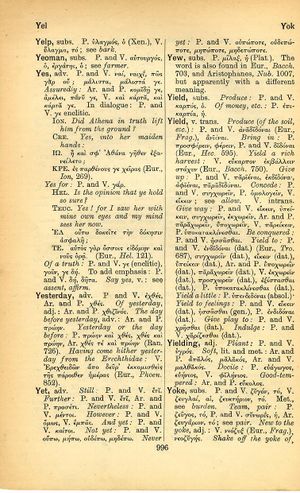yew: Difference between revisions
From LSJ
οἷς τὰ ὁρώμενα τὴν ἀρχὴν ἐνδίδωσι, καὶ οἷον ὑπήνεμα διὰ τῶν ὀφθαλμῶν τὰ πάθη ταῖς ψυχαῖς εἰστοξεύονται → who taketh his beginning and occasion from something which is seen, and then his passion, as though wind borne, shoots through the eyes and into the heart
m (Text replacement - "<b class="b2">Bacch.</b>" to "''Bacch.''") |
m (Text replacement - "<b class="b2">Nub.</b>" to "''Nub.''") |
||
| Line 4: | Line 4: | ||
P. [[μῖλαξ]], ἡ (Plat.). | P. [[μῖλαξ]], ἡ (Plat.). | ||
<b class="b2"></b>The word is also found in Eur., ''Bacch.'' 703, and Aristophanes, | <b class="b2"></b>The word is also found in Eur., ''Bacch.'' 703, and Aristophanes, ''Nub.'' 1007, but apparently with a different meaning. | ||
}} | }} | ||
Revision as of 16:54, 7 August 2017
English > Greek (Woodhouse)
subs.
P. μῖλαξ, ἡ (Plat.).
The word is also found in Eur., Bacch. 703, and Aristophanes, Nub. 1007, but apparently with a different meaning.

